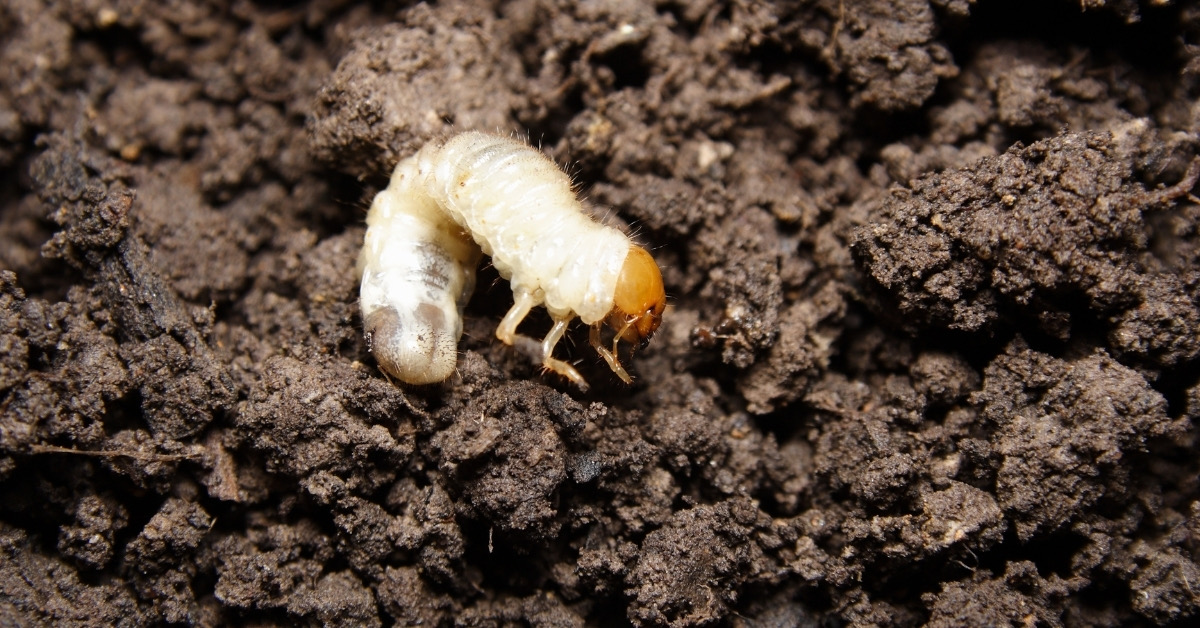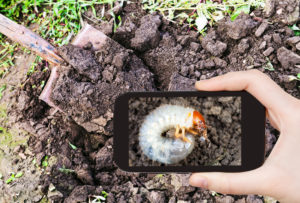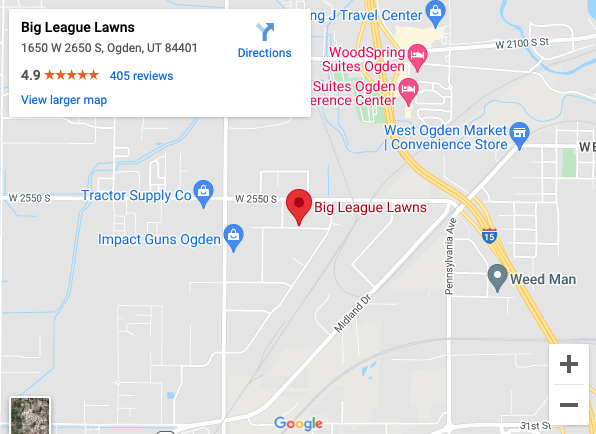
Lawn grubs are a pest nobody wants in their lawn. Unfortunately, once lawn grubs begin to infest your lawn, they are notoriously difficult to get rid of and they can cause extensive damage in very little time. Lawn grubs are small pests that feed off grass roots in your lawn, resulting in brown and dead spots that can last numerous seasons. The good news is that there are steps you can take to treat and prevent future lawn grub problems. Our team at Big League Lawns offers preventative grub control applications for residential and commercial customers in Weber and Davis County Utah. Beginning with a free lawn analysis, we determine the proper treatment plan for your yard based on your grass type, soil composition, climate, and other important factors.
Contact Big League Lawns for Grub Prevention Services at 801-773-9999 today!
Lawn Grubs: What You Need to Know
Lawn grubs are typically dormant and live in the soil throughout the colder months of fall and winter. Once the weather warms up during the spring and summer, lawn grubs emerge and begin snacking on the roots of your grass. These small grubs are white in color, c-shaped, and come in the form larvae from local beetle populations. As the larvae grow into adult beetles over the summer, they will emerge to be visible above the soil. At this point, they may begin eating flowers and garden plants, causing further devastation to your yard. Eventually, they will lay eggs and the cycle will continue into the next season—unless you do something about it!
Does My Lawn Have Grubs?

Not sure if your lawn has grubs? There are a few steps you can take to determine if this is the case. Start by locating a patch of brown or dead grass on your property. Using a shovel, dig up a chunk of the grass to a depth of about two inches. Now, look up close for small (less than an inch in length) grubs that are white in color. Even if you only spot a few of them, it's likely that the problem will only multiply if you don't act quickly. Depending on the severity of the infestation, you may have just a few small patches of dying grass or very large sections.
FAQ - Lawn Grubs
Grubs are the larvae of the different types of beetles that you can find in gardens. The common ones might include Japanese beetles or June bugs. Usually, they grow on your lawn during the summer months. It's because most beetles lay eggs during June and July.
The beetles lay the eggs a few inches in the soil, making it difficult to reach the eggs during gardening procedures. Lawn grubs are destructive, especially when it comes to spaces that have grass. Thus, you need to learn about lawn grub control if you have a large garden.
Like all pests that can affect your garden, you can use a few specific techniques to combat the problem. Using the right prevention techniques can be crucial because it can save you from the hassle of having to work on your garden again. The most effective approach for managing the problem would be to use chemical control techniques. There is no well-known natural grub control for lawn techniques to help control the presence of the bugs. The common ones are artificial.
However, applying the insecticide the right way is critical. You may have to ensure the product gets through into the soil, a few inches deep. Plus, using preventative grub control techniques such as irrigation is essential for a few days. It helps ensure the product gets deep into the soil
The lawn grubs are not active during the winter season. As the temperatures decrease, they tend to burrow further underground. Plus, the beetle females usually lay their eggs underground during June and July. During the winter, summer, and spring months, most grubs live underground and feed on growing crops.
They can’t thrive in the cold weather associated with the winter season. The low temperatures are not suitable for their development, and this often means they have to hibernate. Thus, they can be challenging to exterminate, and it's also challenging to determine their presence. Applying the right grub prevention and control techniques means you have to learn about when they are active.
While lawn grubs are destructive to various plant life types, they cannot cause any harm to trees. It’s because trees have well-developed roots, which makes them less prone to damage from grubs. These pests will most commonly affect small plants such as grass, flowers, and more. Researchers have recently identified Polyphylla Decemlineata and Polyphylla Sobrina as the leading threats to the growth of trees. However, the other remaining species of grubs won't cause any compromise to the development and growth of trees.
The best time to treat lawn grubs would be before the females lay eggs, which is usually in June or July. Applying the pesticide earlier might be ineffective, especially as the grubs tend to live deep underground. These include trying to treat the lawn grubs during the spring or winter when they are in hibernation.
Thus, the best time to treat the females would be during April and May. Plus, using the right technique is also crucial, as most females tend to lay their eggs a few inches deep in the soil. A common example of a product for treating lawn grubs would be chlorantraniliprole, which your lawn care Utah should have in store.
Grub Treatment for Lawns in Utah
Avoid grabbing the first pesticide you see at your local gardening or home improvement store. Unfortunately, these harsh chemicals often do more harm to your lawn than good, and they may not completely eradicate your grub problem. Instead, the best thing you can do is to seek professional lawn treatment for grubs. Here at Big League Lawns, we specialize in grub prevention and treatment in Utah, providing service to customers in Weber and Davis counties. Our lawn pest control services stop not only grubs, but several other common yard pests as well, including sod web worms and chinch bugs. We also offer a range of other lawn care services, such as:
If you're dealing with pesky lawn grubs on your property, give Big League Lawns a call today at (801) 773-9999! We'd be happy to set up a free lawn analysis, and we're available six days a week (including Saturdays), so we can find a date and time that works with your busy schedule!


